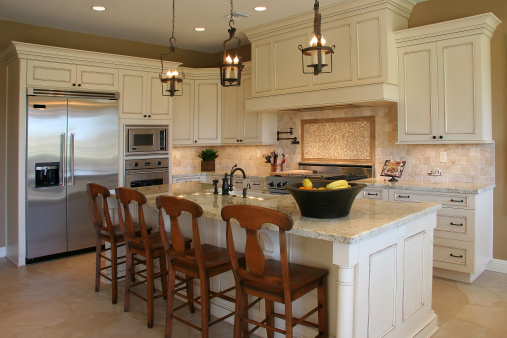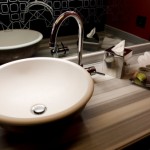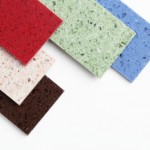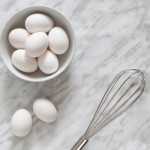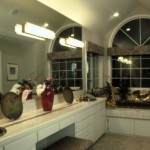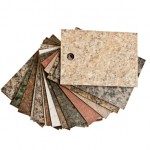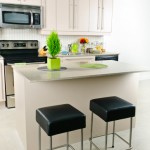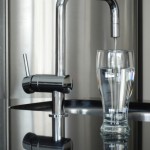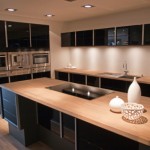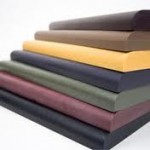So you are looking for a countertop surface for your kitchen or bath remodel. You have come to the right place! Some pros and cons are listed below for the most common countertop surfaces. (Source: houzz.com and getwithgreen.com)
Granite
Granite (See above featured photo) is considered the countertop material of choice when there are no other things to think about – like money. It defines elegance in a kitchen or bath. The beauty of the stone contributes to the beauty of even the most modest kitchen.
Pros: The host of colors and patterns found in nature make each piece one of a kind. It stands up well to splashes, knife nicks, heat and other wear and tear.
Cons: Very expensive, requires lots of maintenance, including periodic sealing; absorbs stains; can crack; limited range of colors available. And its heaviness means you’ll need very sturdy cabinet boxes to support the weight.
Cost: $35 to $100 per square foot, installed
Solid Surfacing
Made primarily from acrylic and polyester, solid surfacing first was sold under the brand name Corian, which is often (erroneously) used as a generic term for it. Today, it’s made by a host of manufacturers and has enjoyed steady popularity over the years.
Pros: Because solid surfacing is nonporous, it’s virtually maintenance free — no sealing or special cleaning required. Although it can be susceptible to scratches and burns, those are easy to sand out. Color and pattern options are extensive, and because you’re not trying for the look of a natural material, you can experiment with vibrant hues such as turquoise or tomato red. Seamless installation means there are no cracks to trap dirt and debris.
Cons: Solid surfacing can have a patently artificial look and feel, yet can approach the price of natural stone. As mentioned above, it doesn’t stand up to hot pans or sharp knives as well as other materials.
Cost: $35 to $80 per square foot, installed
Quartz Surfacing
Brands on the market are DuPont Zodiaq®, Cambria Quartz, and Silestone. Crafted of resin and quartz chips tinted with color, quartz surfacing is also called engineered quartz or engineered stone.
Pros: It is available in a larger range of colors than granite and has a nonporous surface that resists scratches. It’s easy to maintain, without the annual sealing required by natural stone. is a good compromise between the beauty of stone and the easy care of solid surfacing. Quartz surfacing has the same advantages as solid surfacing with regard to maintenance.
Cons: This material doesn’t have the natural variegation of granite, so it may be evident that it’s an engineered product. It’s relatively pricey, although its durability can make it a worthwhile investment.
Cost: $40 to $90 per square foot, installed
Marble
Because of it’s extremely high price tag, marble is not often seen on the countertops of whole kitchens. To get the luxurious look, use it on an island or inset at a baking center. (Cultured Marble may be another option. It is a common durable surface used in bathrooms and comes with a more moderate price tag than real marble.
Pros: Nothing beats marble for sheer elegance. It stands up to heat well, and because it remains perennially cool, it’s a traditional choice for pastry and baking stations.
Cons: Marble is very susceptible to stains, even with sealing. For that reason, it’s not often used throughout an entire kitchen — most homeowners limit it to one or two small areas. It can also scratch and chip.
Cost: $40 to $100 per square foot, installed
Tile
Modular and inexpensive, ceramic and porcelain tile offers nearly limitless options for colors and designs. Tile works with almost any kitchen style, from country to majestic Old World.
Pros: It holds its own against heat and sharp blades, and resists stains. If one or two tiles chip or crack, they’re fairly easy to replace.
Cons: Tile’s uneven surface can make it difficult to balance a cutting board or roll out a pie crust. Unsealed grout is prone to staining; standing moisture can damage it and contribute to bacterial growth.
Cost: $10 to $80 per square foot, installed
Laminate
Made of paper blended with resins and fused to particle board, laminate has been a kitchen mainstay for decades. In the past, it hasn’t always had a reputation as stylish, but that’s changing: The latest designs on the market mimic stone, butcher block and other pricier surfaces.
Pros: Laminate is one of the most affordable countertop materials, so it’s a good choice if your budget is tight. It’s low maintenance and easy to clean. Its light weight doesn’t require the support of a thick cabinet base.
Cons: Laminate is prone to scratching, burns and, in some cases, staining. With wear and moisture exposure, the layers can peel. Because of the raw particle board core, you can’t use laminate with undermount sinks, and it’s also difficult to repair if it gets damaged.
Cost: $10 to $30 per square foot, installed
Soapstone
Although it’s in no danger of overtaking granite, soapstone has come into its own as a countertop material. It offers subtle, nuanced beauty yet feels humbler than granite or marble.
Pros: Soapstone has a natural softness and depth that fits very well with older and cottage-style homes. Although it usually starts out light to medium gray, it darkens with time. (Most people enjoy the acquired patina, but you may consider this a con.)
Cons: Soapstone needs polishing with oil to keep it in top shape. It can crack over time, and it can’t handle knife scratches and nicks as well as some other types of stone. The natural roughness of its surface can scuff glassware and china.
Cost: $45 to $100 per square foot, installed
Stainless Steel
Once found mostly in commercial kitchens, stainless steel has slipped into vogue within the past two decades. These countertops are custom-made to fit your kitchen, so you’re guaranteed a tailored look.
Pros: There’s a reason stainless steel is used in restaurants and other high-traffic kitchens: It’s nearly indestructible, and it resists heat and bacteria. It also provides a very distinctive look that feels appropriate in contemporary and industrial-style kitchens.
Cons: Fingerprints show and must be wiped off frequently, and stainless steel can also dent. It can be loud as pots, pans and dishware clang against the surface. Chemicals can affect its color and cause unwanted etching. Stainless steel is extremely expensive due to the custom fabrication.
Cost: $65 to $125 per square foot, installed
Concrete
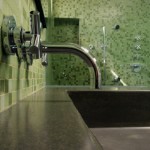
Concrete countertops are versatile and color options are nearly endless with integral color, staining, or both.
Think concrete is just for floors? Think again. Slightly edgier than other materials, concrete countertops have an industrial chic that fits right into a loft or adds interest to an otherwise traditional space.
Pros: Concrete is extremely versatile: It can be cast in any shape and custom tinted any shade you wish. You easily can add unique inlays, such as glass fragments, rocks and shells. Concrete stands up well to heavy use, although it isn’t as heat-resistant as some other surfaces.
Cons: Because it’s porous, concrete will stain without frequent sealing. With time and settling, small cracks can develop. Concrete is extremely heavy and will need strong support beneath. Like stainless steel, its custom creation ups the price tag.
Cost: $75 to $125 per square foot, installed
Butcher-Block
Butcher-block has a classic appeal and always looks fresh. It’s especially fitting for traditional, country and cottage-style kitchens.
Pros: Many homeowners like butcher block’s warm, natural appearance and variegated wood tones. Although knives scratch it, many people like the shopworn look it develops — after all, it’s what chopping blocks have been made of for years. But you can also sand scratches down with ease.
Cons: Wood swells and contracts with moisture exposure, and butcher block is no exception. It harbors bacteria and needs frequent disinfecting. Oiling is a must to fill in scratches and protect the surface.
Cost: $35 to $70 per square foot, installed
Paper Composite
Paper countertops? You read it right. Created from paper fibers mixed with resin, this surface is ecofriendly and a whole lot more durable than it sounds.
Pros: Paper composite evokes the look of solid surfacing or laminate but with a warmer sensibility. It’s surprisingly hardy and can withstand heat and water admirably. It’s also a great deal lighter than natural stone or concrete.
Cons: The material isn’t scratch proof and is susceptible to chemical damage. It needs an occasional rub down with mineral oil, and even sanding, to refresh it. Although it sounds as though it would be a lower-budget option, it isn’t (unless you install it yourself).
Cost: $85 to $125 per square foot, installed
